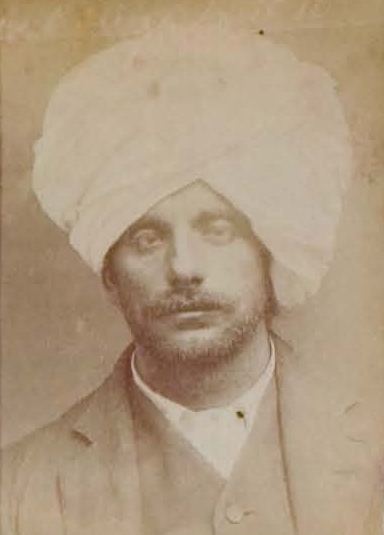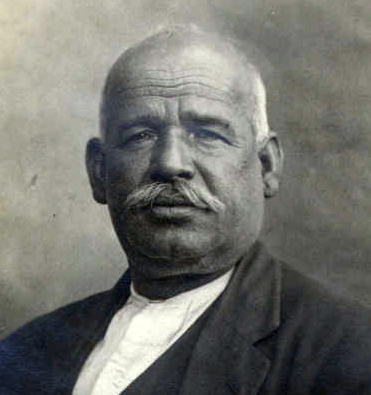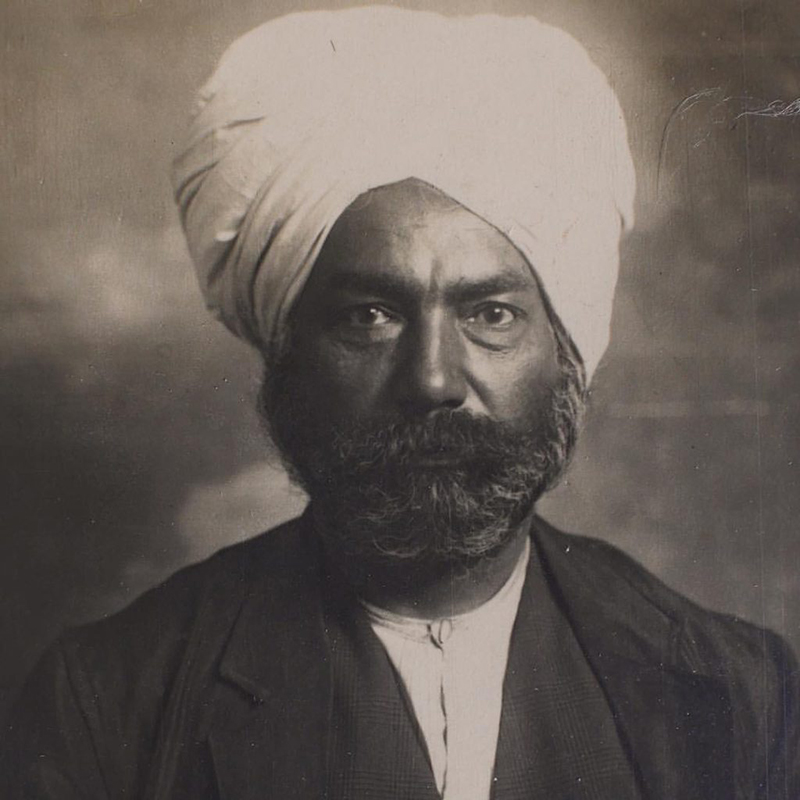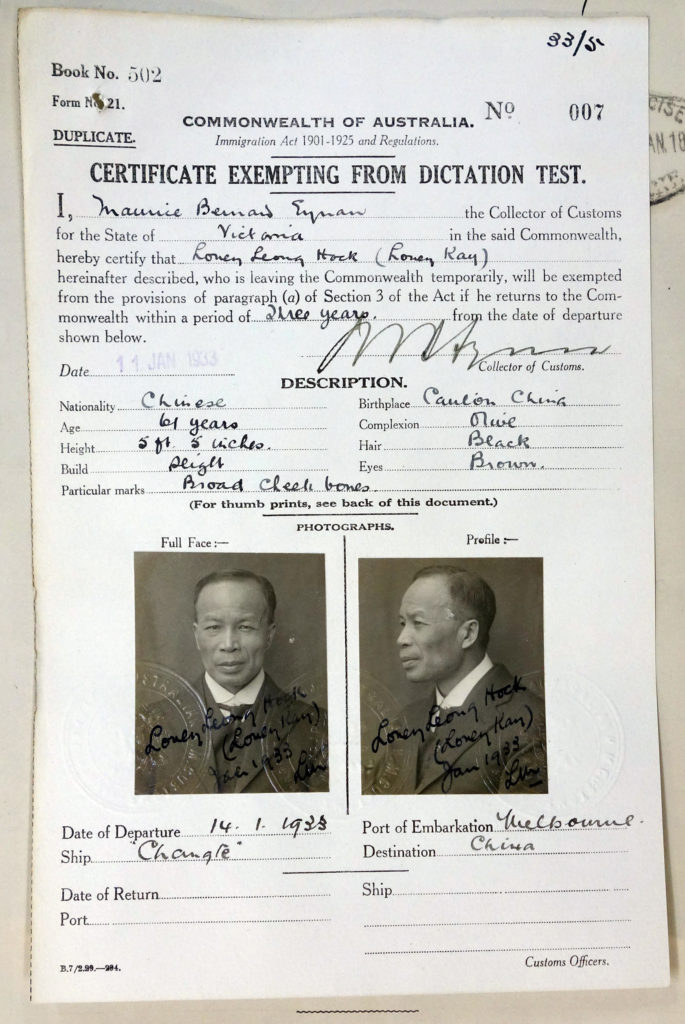By Len Kenna and Crystal Jordan (Australian Indian Historical Society Inc)
To have some understanding of the various names given to the people from the sub-continent it is necessary to understand that India was, and still is, a series of small nation states with their own distinctive culture and religious differences. That distinction has been blurred and made more complicated as a result of wars, foreign invasions, fluid borders and the passing of time.
In addition most early Indian arrivals to Australia were illiterate in English and their native tongue. Most in fact, when they arrived in Australia, could not speak English.
Australians who became acquainted with them, acted on their behalf,wrote letters and assisted in other ways, also had little knowledge of their religious or ethnic backgrounds and many Indian languages do not easily or accurately translate into English. As a result the spelling of names was left to the whim or discretion of the person recording the names.
The first migrants to arrive in Australia in the early nineteenth century were mainly deserters from ships or others who arrived by chance. These would have been mainly Muslims, as Hindus were restricted, although not banned, from travelling over water for religious reasons. Sikhs came from the Punjab and the Punjab is landlocked which inhibited ocean-going voyages.
The first major migration into Australia was the cameleers who arrived in the 1860s. They came to Australia as labourers under the archaic Masters and Servants Act, which bound them exclusively to their Master. These Cameleers came from Punjab, Baluchistan, Sindh, the North West Provinces of India and Afghanistan. They were mainly Muslims but some were Sikhs. They were kept in subjugation, by their Masters: usually their own countrymen.
They were poorly paid, badly exploited and spent long periods in the bush. As a result they were unable to mix with mainstream Australia. They became known as ‘Afghans’ regardless of their place of origin or their religious or ethnic backgrounds.
The next wave of Indians came arrived in the last decades of the twentieth century between 1880 and 1901. This was the largest migration of self-funded non-Europeans to arrive in Australia until the present time. This group can be divided into three cohorts, Sikhs who appear to be the largest group, second Muslims and third Hindus. They were all mainly illiterate farmers who came to Australia to increase their family wealth. The exact number of people who arrived at this time is unknown as many landed in ports where there was little or no supervision of arrivals. In many coastal towns in Australia the local Police acted as Customs Officers and were not always present when ships landed with Indian migrants.
Indian arrivals came in three different ways:
- Their fares and accommodation was paid by family members or people from their village.
- They worked their way.
- They jumped ship and were assisted by friends, family members or Indians of the same religious or ethnic background. This group became labourers, farm workers, sugarcane cutters and hawkers etc.
Most Sikhs who came to Australia at this time used the name ‘Singh’ for men and ‘Kaur’ for women and most but not all came from the Punjab. The name ‘Singh’ usually identifies a man of the Sikh religion regardless as to their place of birth. These men were mistakenly called ‘Hindoos’.
Muslims can also be identified by their names, names such as, Khan, Ali, Mahomed, Mahomet etc. They came from most places in India but in the main they were concentrated along the west coast of India and were called by Australians as ‘Mahommedans’.
The third group to arrive were Hindus. They were fewer in number and to confuse the identification of Hindus and Sikhs a small number of Hindus also have the name ‘Singh’. Most Hindus who came to Australia in this period came from the Punjab, however, Hindus also came from other parts of India.
Much of the confusion regarding the spelling of names given to people from India was caused by the fact that most Australians had little understanding of India and Indian culture. They spelt Indian names phonetically and placed people into religious groups regardless of the accuracy or geographical place of birth.
For a list of the Indian names in the Victorian CEDT Register Index with their alternate names see the table below.
Here are three examples of how you need alternative names to track these men through the records.
Charlie Argent Singh of Bendigo and Nyah West

[Central Register of Male Prisoners VPRS 515/P1 ITEM 61, p. 3383]
The Victorian CEDT Register Index contains information about Charlie Argin Singh, a 61 year old farm labourer from Nyah West who applied for a CEDT in 1933 and this was extended in 1935, 1939 and 1941. Information he provided suggests he was born around 1872 and arrived in Australia around 1897-1898.

The name ‘Argin’ can also be spelt: Argent and Argen. Searching the Victorian Central Register of Males Prisoners held at the Public Records Office of Victoria (VPRS 515) we find Charlie Argent Singh, an Indian hawker born in 1871, who was convicted of assault in Bendigo and sentenced to six months hard labour in 1910. He was born in 1871 and arrived in Australia in 1897 on the ‘New Guinea’. According to his prison record he was a ‘Hindoo’ and had a wife in India.
Mahomed Gujar of Warrnambool

[NAA: B13, 1933/18203]
The Victorian CEDT Register Index contains information about ‘C Mahomed‘ and ‘Mahomed Gujar‘. Mohomed Gujar, a storekeeper and hawker in Warrnambool, was also known as Charlie Mahomed, Googer, Goojer, and Majommed. Further information about Mohamed Gujar can be found on the Australian Indian Historical Society blog here.
Bhugwan Singh and Cabel Singh of Quambatook
The Victorian CEDT Register Index contains information about ‘Bagwan Singh‘, a farmer in Quambatook who appied for a CEDT to travel in 1919 with his business partner, Cabel Singh. They both left in 1919 and returned in 1923 on the same ships. Further information about Bhugwan Singh and Cabel Singh can be found on the Australian Indian Historical Society blog here.

[NAA: MT19/4, 1927/BHUGWAN SINGH]
Indian names in the Victorian CEDT Register Index with alternate names
| Name in Vic Register Index | Alternate Name |
| Abdool Curreem | Abdul Curram, Karam, Karem |
| Acbar Deen | Ackbar Deen |
| Abdulah Khan | Abdulla Khan, Adulat Khan, Adalat Khan |
| Ahmed Deem | Ahmed Deen |
| Alah Dad | Alladad, Alla Daard |
| Alf Deen | Alf Deen, Alif Deen, Aluf Deen |
| Ali Ahamed | Ali Ahmed |
| Ali Bux | Ali Bux Kahn, Bakhsh, Baksch, Buksh |
| Allie Mahomed | Ali Mahomed Khan Mahommed/Mahomet |
| Amad Ali Khan | Ahmed Ali Khan |
| Ameer Alie Khan | Amir Allie Khan, Amir Ali |
| Ameer Bux | Amir Bux, Ameer Bakhsh, Ameer Baksch, Ameer Buksh |
| Aran Singh | Anan Singh, Anant Singh |
| Argin Singh | Argen Singh, Argent Singh, Charlie Argent Singh |
| Ata Mahomed | Atta Mahomed/Mohamed |
| Barghallie Khan | Barg Ali Khan, Bargh Ali, Bargallie, Bargally |
| Barna Khan | Bunna Khan |
| Basant Singh Gill | Besanta Singh Gill, Besant Singh Gill, Besanta Singh, Charlie Besanta Singh |
| Bashin Singh | Bashir Singh, Bhasin Singh |
| Bhaq Singh | Bagh Singh |
| Bhagwan Singh | Bagwan, Bhagwan, Baguin, Bagwhan, Bugwan, Bhugwan, Bhugwana |
| Bhola Singh | Bola, Bolah |
| Bollaram | Bolla Ram, Bolah, Bola |
| Gudit Singh | Gurditt, Gurdit, Gordit, Gurdat, Gadet |
| Bishen Singh | Bishan |
| Boogar Sing | Booga Singh |
| Boota Singh | Bootah |
| Braham Singh | Brahm, Brahma |
| Budda Niaz Allie | Budh |
| Buden Singh | Budin |
| Budh Singh | Bud |
| Buky Khomus | Bucksey Khomus, Buckshee Khomus, Khomu |
| Burhan Allie Khan | Barg Ali Khan, Bargh, Bargallie, Bargally |
| Buro Raymond | Baroo, Baru, Beero |
| Buttan Singh | Button |
| C Mahomed | Charlie Mahomed, Mahomed Gujar, Gujar Mahomed |
| Cabel Singh | Kabel, Kable, Cabel |
| Cahool Singh | Cabool, Cabel, Kabel |
| Calab Deen | Kaleb |
| Careem Bux | Karem, Karam, Carram, Carrum, Bakhsh, Baksch, Buksh |
| Carrum Deen Khuda Box | Bux, Bakhsh, Baksch, Buksh |
| Cashem Deen | Kashem, Kassem, Kishen, Kishin |
| Cew Nary Bux | Nabby Bux, Naby Box, Navy, Bakhsh, Baksch, Buksh |
| Chadu Khan | Charlie Khan, Chedu Khan |
| Chandah Singh | Chanda |
| Chere Singh | Cher, Chere, Sher |
| Choodrew Mongtor | Chowdree, Chowdhury, Mongta, Mongtah |
| Choor Singh | Choor, Chookra, Choora |
| Daleep Singh | Dalip |
| Dalumull Roopchand | Dulumal |
| Daulusaui Chaudass | Daulutzai Chaudas |
| Devan Singh | Divan, Dewan |
| Dewan Allie Khan | Divan, Devan, Ali |
| Dhan Singh | Dhian |
| Dhera Mall | Dheera |
| Doola Singh | Doolah, Dulah |
| Doolah Mohammad | Doola, Mohamed, Mohamed |
| Easser Singh | Essar, Esar, Eser |
| Ebrahim Khan | Ibrahim |
| Edoo | Edo, Edau |
| Eiser Singh | Isar, Esse, Issey, Esser, Eser |
| Elem Deen | Ellum, Elam, Elim, Illum, Ilum |
| Esar Dass | Isar, Esser, Eser |
| Fakki Alli | Fatta, Fatah, Fateh, Ali, Allie |
| Farman Allie | Far Ali Khan, Farman Ali |
| Feroze Allie Khan | Ferose, Feroz, Fayrouz |
| Fatta Shah | Fateh, Fatah |
| Fatta Singh | Fatah, Fateh, |
| Fazal Deen | Fazel, Din |
| Fiagi Bux | Fujja Bakhsh, Baksch, Buksh |
| Foja Singh | Fujja |
| Fulbage Khan | Phool Bagh Khan |
| Galab Jut | Gulab, Ghulab |
| Gallam Mahomed | Ghulam, Gulam, Gholam, Mahamed, Mohammed |
| Garbutchan Singh | Garbuchan Singh |
| Gareeb | Mark Gareeb, Gareeb Meer Bux, Bakhsh, Baksch, Buksh |
| Geun | Gian, Gharne |
| Ghlum Nabee | Gulam, Ghulam, Golam, Nabie, Nabby, Naby |
| Gholam Deen | Gulam, Ghulam, Golam |
| Gidumull Topdass | Topandas, Topandass |
| Gindwadgen Singh | Gurdev Gian, Gurviay |
| Goidetha Singh | Gordetta, Gordet, Gurdit, Gourdit |
| Goodya Paulo | Goodie Paulo |
| Goola Hassan Khan | Ghulam, Gulam, Goolam |
| Gooalm Alli Khan | Gulum, Ghulam, Ali Kahn |
| Gopal Singh | Gurpal Singh |
| Gorokl Das | Gorkal |
| Gulbage Khan | Gulbagh, Gulbag |
| Gumoh | Gumo |
| Gunda Singh | Gundah, Gundar |
| Gungah Brahim | Gunga Brahm, Braham |
| Habbadan Khan | Harbhajan |
| Hackummud Chitam | Hackumound Chihu, Hackmud Chikam |
| Hardadd Singh | Hardit, Hardat |
| Hafiz Hoor Ahmed | Hafiz Noor |
| Hakam Khan | Hakum, Hakim, Hakeem, Hukam, Hookem, Harkam |
| Harman Singh | Harnam, Herman, Hermen, Hernam |
| Hassen Deen | Hassan |
| Hera Singh | Hira Singh |
| Hyatt Bux | Bakhsh, Baksch, Buksh |
| Illum Mahomed | Ellum, Elam, Ilum, Mohamed, Mahommed |
| Indar Singh | Inder |
| India Singh | Indra, Indar, Inder |
| Ishmael J Mahomed | Ismael John Mahomed, Ismail, Esmail, Mohamet, Mohammed |
| Jab Singh | Jabber, Jabbar, Jagger, Jag, Jager, Jagir |
| Jaffer Allie | Jaiffar, Jeffer, Jaffar, Ali |
| Jageer Singh | Jagir |
| Jamalla Singh | Jamail |
| Jeeman Cashmere | Jeevan, Kasmiri, Kashmiri |
| Jearan Khan | Jevan, Jeevan |
| Jervan | Jeevan |
| Jit Singh | Jetta, Jeet |
| Joalla Singh | Joallah, Jowala |
| Johar | Johal |
| Juan Khan | Gian, Gharne, John |
| Juggah Singh | Juggar, Jagir, Jager |
| Jumee Khan | Jumma, Jumna, Juma, |
| Jumma Mutchee | Jumma, Jumna, Juma, Munchie, Matchie, Munshie |
| Kabool Khan | Qabool |
| Kader Bux | Kadder, Qadir, Bux, Bakhsh, Baksch, Buksh |
| Khake | Khake |
| Kala Khan | Kalla, Kali, Kala |
| Kalbo Khan | Kaloo |
| Karam Singh | Karem, Karaum, Karram, Carram, Carrum |
| Kardah Bosh Boota | Kooda Bux Boota, Khuda Bux, Baksch, Buksch, Buksh |
| Kareem Bux | Karem, Carram, Carrum, Baksch, Buksch, Buksh |
| Karloo Khan | Kaloo Deen, Karoo Deen |
| Kaseta Singh | Kasheta |
| Kashim Deen | Qasim, Qaseem, Qazeem, Qazim, Kaseem, Kasseem |
| Kassam Khan | Cassim, Quasim |
| Keemah | Kheem, Kumah |
| Keroo Khan | Karroo, Karoo |
| Khaki | Khaka |
| Khuda Bux | Khoda, Khudah, Kudah, Kudda Bux Deen, Baksch, Buksch, Buksh |
| Kiam Deen | Qyam, Qiam |
| Kishin Singh | Kishan, Kishen, Keshan, Kissen |
| Korrum Deen | Curam, Karem, Karum, Kareem |
| Kulub Deen | Kaleb |
| Kushalla | Kushala, Kushali |
| Ladda Cashmera | Ludda Kashmiri, Luada |
| Lataf Khan | Lataft, Latif |
| Hakkim Khan | Hukam, Hakim, Harkam, Hookem |
| Lubhu Singh | Lubbo, Lubboo, Lubu |
| Mahair Khan | Mehar |
| Mahan Khan | Mehan |
| Mahomed Allie | Ali, Mahommed, Mahomet |
| Mahomed Allie Khan | Mahomed Ali Khan |
| Mahomed Bux | Mahommed, Mahomet, Baksch, Buksch, Buksh |
| Mahomed Fuzal Khan | Fuzzel |
| Mahomed Gujar | Gujar Mahomed, Charlie Mahomed, Gujer |
| Mahomed Sharker | Mahommed Shakir |
| Mair Bux | Meer, Amir, Ameer, Baksch, Buksch, Buksh |
| Malla Singh | Mulla, Mullah |
| Malook Singh | Maluk |
| Man Dean | Marm, Deen, Narm Deen |
| Marad Bux | Meera, Baksch, Buksch, Buksh |
| Mazid Khan | Majid, Majeed |
| Meer Alli Khan | Ameer, Amir, Ali |
| Meerzman | Meezaman, Meraman, Meerasman |
| Meya Mahomed Ariff | Mehar, Meyar, Meyah, Meyan, Meya, Maya |
| Meya Mahomed Bux | Mehar, Meyar, Meyah, Meyan, Meya, Maya, Baksch, Buksch, Buksh |
| Maya Jallaldeen | Mehar, Meyar, Meyah, Meyan, Meya, Maya |
| Meyan Alla Datta | Mehar, Meyan, Miyan, Alla Ditta |
| Meyer Singh | Mehar, Meyar, Meyah, Meyan, Meya, Maya |
| Missery Singh | Mystery Assaram, Rasaram |
| Miyan Mahboob Allum | Miyan Mahbub Allum |
| Miyga Khan | Miga |
| Mohamed Ismail | Ismael, John |
| Mohammet Bux | Mohamet, Baksch, Buksch, Buksh |
| Molla Bux | Mulla, Mullah, Baksch, Buksch, Buksh |
| Molla Dad | Moula, Molla, Mullah, Alladad |
| Monga Khan | Manga |
| Mota Khan | Moota |
| Mudjtbar Shah | Mujtaba |
| Mukkau Sheak Mahomed | Mukka Sheik |
| Munad Bux | Murad, Baksch, Buksch, Buksh |
| Munshee Kareem Bux | Munshee, Munshie, Munsie, Baksch, Buksch, Buksh |
| Mustafa Khan | Mustifa, Mustapha |
| Mutto | Muttoo |
| Nabob Khan | Nawab, Naboo, Nabo, Noab, Nowab |
| Naimet Khan | Namet, Namat, Naimat |
| Nandh singh | Nand |
| Narain Singh | Naran |
| Natha Singh | Nutta, Nuttah, Nuttha |
| Nathey Khan | Nathu, Nutta, Nuttah, Nuttha |
| Nathoo Sing | Nathoo Singh, Natha |
| Nazam Deem | Nazim Deen |
| Neasali | Naiz Ali, Naze Ali |
| New Gundah Singh | Gunda, Ganda |
| Partapa | Purtab, Purtabh, Purtarb, Pertab |
| Newrah | Nawrah |
| Nie Toola | Nitulla, Nuttoo, Nutta, Nutha, Natha |
| Noor Allum | Nur, Allam, Alum |
| Nunda Singh | Nundah |
| Nuthoo Khan Rie | Nuttoo, Nutta, Nutha, Nuthoo, Nuttoo Rai |
| Oahurwull Tharowull/Pharramull | Assomull Pamamull, Rocimull/Rochemull Pamamull |
| Omah Dean | Omar, Deen |
| Ottam Singh | Otim, Outim |
| Phan Singh | Khan |
| Pahvan | Pavan |
| Palwan Khan | Pelwhan, Pelwan, Palwhan, Pailwan |
| Parg Singh | Parget, Pargat |
| Pernop Singh | Pertop, Pertap, Pertab, Purtabh |
| Phola | Pollah, Pola, Polah |
| Pier Bux | Pir, Peer, Baksch, Buksch, Buksh |
| Punditt Salgrahm | Pundit |
| Rahim Bakhsh Khan | Rahim, Rahm, Raheem, Bux, Baksch, Buksch, Buksh |
| Rahim Tulla | Rahm, Raheem, Ramatullah, Rahmatulla, Rhamatulla |
| Rahna Khan | Rahana |
| Rala Ghamon | Ghaman |
| Ralla singh | Rallah, Rala, Roola, Ruila |
| Ranga/Ranja Khan | Rajah |
| Rasmat Khan | Rashmat, Rashma, Rashmai, Rashmii |
| Ratten Singh | Rattan, ratan |
| Rochemull Pamamull | Rochimull |
| Romali Singh | Romal, Ramali |
| Rubya Singh | Rulya, Rubah, Rulia, Rule, Roola |
| Rurah | Roorah, Roor |
| Sab Deen | Sabah, Sahib, Sarb |
| Saf Alli Khan | Saif, Saifalli, Vasilly |
| Sahoo Shah | Sahu, Shau, Sahoo |
| Said abdul Hak | Haq |
| Said Shah Jeelam | Jelani, Geelani |
| Saltuna Singh | Sultan, Sultana |
| Samonda Singh | Samunda, Samunder, Samund, Samonde, Simon |
| Santogh Singh | Santokh |
| Saun Singh | Sorn |
| Sha Wallie Khan | Shah Wali Khan, Shah Bally Khan, Civelli Kahn, Shah Valli Khan |
| Shah Iwar Khan | Shah Swar Khan |
| Shair Singh | Chere, Shere. Sher, Share |
| Shairsman Jan Bux | Shasmani, Shahsman, Baksch, Buksch, Buksh |
| Shar Khan | Sher, Shah |
| Shera Man | Sher, Sheera, Chere |
| Sheriff Deen Wazeer | Sharf, Sharif, Wazir |
| Sidara Singh | Sidhara |
| Sobah Singh | Soba |
| Sohna/Soni Khan | Sona, Soni, Sonah |
| Somond Singh | Somand, Soman, Suman, Samunda, Samunder, Samund, Samonde, Simon |
| Sorn Singh | Sarn, Saran |
| Suchet Singh | Suchette, Sucha, Suchah |
| Suchie Chand | Sucha, Suckie, Suki |
| Suden Singh | Sundah, Sunda |
| Sujah Singh | Sucha, Suchah |
| Sunda Singh | Sunder, Sundah |
| Sunghgoo | Sandhoo, Sandhu |
| Suttar Din Gujar | Suta, Sutar, Sutah, Deen, Bajar |
| Taroo Khan | Taru |
Len Kenna and Crystal Jordan
Len Kenna was educated at La Trobe University studying History and Archaeology. He has been interested in things Indian from his childhood when Indian hawkers called at his family home in Hamilton, Victoria. In 2004 Len was contacted by Multicultural Commission Victoria to write a history of Indians in Australia. This was the first detailed study of Indian history in Australia.
Crystal Jordan assisted Len because she has a keen interest in India. Her father was born in India. The Australian Indian Historical Society Inc. was formed to research and publish the results of that research and to form a link to the Indian Community.
Len and Crystal have written and published sixteen books on Indians in Australia drawing on official records and primary sources. One on these books: The History of Sikhs in Australia, has been translated into Punjabi by Dr. Balwant Singh Dhillion of Nanak Dev University, Amritsar, India and has been distributed worldwide.




